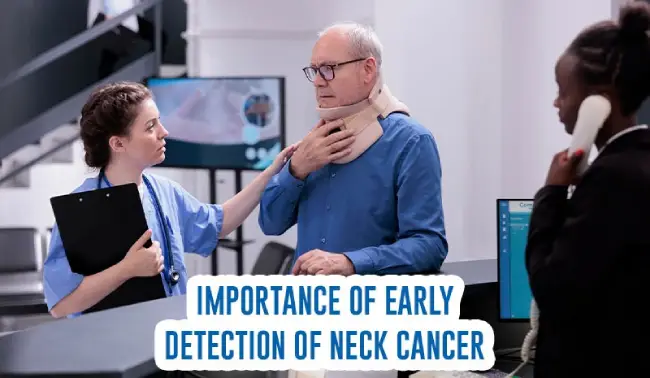
Early diagnosis is critical when it comes to neck cancer. Catching the disease at its initial stages greatly increases the chances of successful treatment and recovery. Unfortunately, neck cancer can be tricky, as its symptoms often resemble those of less serious conditions. That’s why understanding the warning signs and having access to top-tier medical screening is essential.
Aashwi ENT Hospital provides advanced screening tools and personalized treatment plans to detect and manage neck cancer effectively. In this article, we’ll discuss the importance of early diagnosis, the key symptoms to look out for, and how Aashwi ENT Hospital uses cutting-edge technology to offer comprehensive care.
The Importance of Early Neck Cancer Diagnosis
Detecting neck cancer early can make all the difference between a straightforward treatment and a more complex journey involving extensive surgery and long-term therapies. The earlier the cancer is found, the less likely it is to have spread to other areas, such as lymph nodes or distant organs.
1. Improved Treatment Outcomes
When neck cancer is diagnosed early, it is often confined to its original site, allowing for localized treatment like surgery or radiation. As a result, patients can avoid more aggressive treatments such as chemotherapy or radical surgeries that may significantly impact quality of life.
Additionally, survival rates for patients diagnosed early are significantly higher. The five-year survival rate for early-stage neck cancer can be over 80%, whereas late-stage diagnoses can lower that number considerably.
2. Less Invasive Treatments
Early diagnosis also means that less invasive surgical options can be used. For example, instead of a total laryngectomy, where the entire voice box is removed, patients with early-stage cancer might only require a partial laryngectomy or laser surgery, preserving speech and swallowing functions.
Symptoms of Neck Cancer to Watch For
Early-stage neck cancer often presents with subtle symptoms that can be mistaken for more common illnesses, such as a cold or throat infection. However, if these symptoms persist or worsen over time, they shouldn’t be ignored. Below are some key warning signs that might indicate neck cancer:
1. Lump in the Neck
A painless lump in the neck that doesn’t go away over time is a common sign of neck cancer. The lump may be caused by swollen lymph nodes, which could indicate that cancer has spread. Even if the lump is painless, it’s important to get it checked by a doctor if it lasts more than a few weeks.
2. Persistent Sore Throat or Hoarseness
A sore throat that doesn’t improve with time or treatment could be a sign of throat cancer. Similarly, chronic hoarseness or changes in your voice lasting longer than two weeks should be evaluated by a specialist, as this could indicate cancer in the larynx (voice box).
3. Difficulty Swallowing or Breathing
Trouble swallowing (dysphagia) or feeling like food gets stuck in the throat can be a symptom of esophageal or throat cancer. Similarly, breathing difficulties or noisy breathing (stridor) may indicate obstruction caused by a tumor in the throat or neck.
4. Unexplained Weight Loss
Sudden, unexplained weight loss is often a red flag for cancers of various kinds, including neck cancer. If you find yourself losing weight without trying, it’s important to seek medical advice.
5. Ear Pain
Sometimes, neck cancer can cause referred pain in the ear, even though there may be no direct issue with the ear itself. Persistent or severe ear pain without any obvious ear infection could be related to throat or neck cancer.
How Aashwi ENT Hospital Offers Advanced Screening and Treatment
At Aashwi ENT Hospital, detecting and treating neck cancer is approached with cutting-edge medical technologies and a patient-centric care model. From initial screenings to post-operative care, the hospital is equipped to handle every step of the process.
1. Advanced Screening Techniques

- Endoscopic Examinations: Doctors use a small, flexible tube with a camera (endoscope) to view the throat and neck tissues for any abnormal growths or tumors.
- Imaging Tests: CT scans, MRIs, and PET scans are used to create detailed images of the neck and throat, helping to locate tumors and determine whether the cancer has spread to lymph nodes or other areas.
- Biopsies: If an abnormal growth is detected, a biopsy is performed to confirm the presence of cancerous cells. Aashwi ENT Hospital uses minimally invasive techniques, like fine-needle aspiration, for quick and accurate results.
2. Personalized Treatment Plans
Once neck cancer is diagnosed, the treatment approach at Aashwi ENT Hospital is fully customized to each patient’s needs. Here’s how the hospital ensures comprehensive and effective treatment:
- Surgical Expertise: Aashwi ENT Hospital has a team of experienced head and neck surgeons skilled in a range of procedures, from minimally invasive surgeries to complex operations like neck dissection and laryngectomy.
- Radiation Therapy: For patients with early-stage cancer or those who cannot undergo surgery, radiation therapy is a targeted way to destroy cancer cells and shrink tumors. The hospital offers state-of-the-art radiation technologies that minimize damage to surrounding healthy tissues.
- Chemotherapy: In more advanced cases, chemotherapy may be combined with surgery and radiation to treat cancer that has spread. Aashwi ENT Hospital’s oncology team works closely with patients to determine the best combination of treatments.
3. Support and Rehabilitation
Recovery from neck cancer can involve significant physical and emotional challenges. Aashwi ENT Hospital provides a comprehensive rehabilitation program that includes:
- Speech Therapy: For patients who undergo surgeries affecting the voice box, speech therapy is an integral part of the recovery process.
- Nutritional Support: Since neck cancer can affect swallowing and eating, the hospital offers guidance from nutritionists to ensure patients maintain a healthy diet during treatment.
- Psychological Support: Dealing with cancer can be emotionally overwhelming. The hospital offers counseling services to help patients and their families cope with the emotional aspects of cancer treatment and recovery.

















